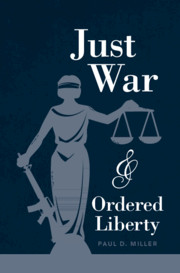
- Publisher:
- Cambridge University Press
- Online publication date:
- January 2021
- Print publication year:
- 2021
- Online ISBN:
- 9781108876544

When is war just? What does justice require? If we lack a commonly-accepted understanding of justice – and thus of just war – what answers can we find in the intellectual history of just war? Miller argues that just war thinking should be understood as unfolding in three traditions: the Augustinian, the Westphalian, and the Liberal, each resting on distinct understandings of natural law, justice, and sovereignty. The central ideas of the Augustinian tradition (sovereignty as responsibility for the common good) can and should be recovered and worked into the Liberal tradition, for which human rights serves the same function. In this reconstructed Augustinian Liberal vision, the violent disruption of ordered liberty is the injury in response to which force may be used and war may be justly waged. Justice requires the vindication and restoration of ordered liberty in, through, and after warfare.
‘As the world confronts fresh threats, ranging from new great powers determined to challenge the existing international order to apocalyptic non-state armed groups determined to destroy that order entirely, there is renewed urgency to consider questions about the justice of war. Thankfully, in this important new book, Paul D. Miller, shows how we can do that. It combines a rare blend of sophisticated and careful historical analysis that yields not one but three just war traditions with the sort of insight into the critical dilemmas of today that can only stem from practical experience on the front line. Doing so, it both expertly illuminates the past in a fresh way and provides a compelling moral framework for thinking about, and debating, the challenges we face today, and will come to face tomorrow.'
Alex J. Bellamy - Professor of Peace and Conflict Studies, The University of Queensland, Australia
‘Miller explicates the core presuppositions of Augustinian realism such as order and justice, and important intersections with classical liberalism, in the context of intractable conflicts, such as in Afghanistan. This is a thoughtful, useful book on the many issues of just war thinking, especially when it comes to jus post bellum and ending wars well.'
Eric Patterson - Author of Just American Wars: Ethical Dilemmas in U.S. Military History (2018)
‘Paul D. Miller's latest book is a well-written, well-crafted meditation on both the actual and intellectual history of the justice of political violence. Gripping current cases – from drones to cyber to Syria – are considered. Combining his own extensive military intelligence expertise (especially in Afghanistan) with his deep theoretical knowledge, Miller builds a meaty, rewarding, important volume focusing on when, if ever, to go to war, and which duties arise in its aftermath. Terrific in breadth, research, application, and overall construction, its best achievement resides in its combination of historical mastery and moral plausibility.'
Brian Orend - Author of The Morality of War (2013) and War and Political Theory (2019).
'Miller examines the trajectory of just war theory by tracing it from its Augustinian origins to a principal shift that occurred in the Westphalian period, and into the current Liberal tradition ... Highly recommended.'
R. Ward Source: Choice
 Loading metrics...
Loading metrics...
* Views captured on Cambridge Core between #date#. This data will be updated every 24 hours.
Usage data cannot currently be displayed.